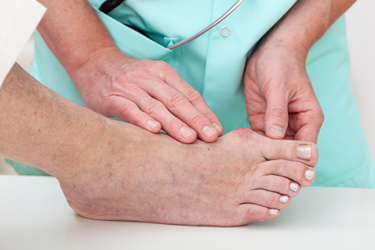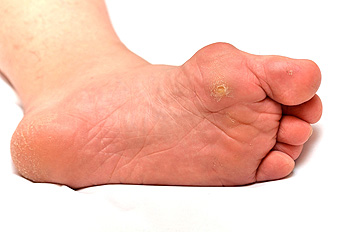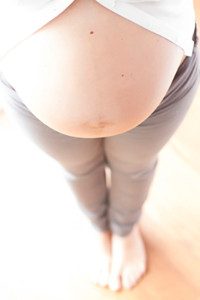Items filtered by date: January 2018
How Do I Know If I Have a Bunion?
 If you have a bump on the side of your big toe, there is a chance that you may have a bunion. It's common for the structure of the foot to change as a result of the big toe being pushed toward the other toes. This worsens misalignment in the toes, resulting in the bony protrusion developing. This progressive condition is commonly caused by a predisposed, inherited trait affecting the structure of the foot. Poor-fitting shoes do not cause bunions, although they may advance the progression of the disorder. Common symptoms may include experiencing numbness or a burning sensation, in addition to observing swelling and redness in the area. Some patients may notice calluses developing on the big toe, and movement may become restricted. A treatment option can include choosing the right shoes with enough room so the toes can be comfortable and move freely. Activities that irritate the bunion, such as standing for long periods of time, should be avoided. If you are experiencing pain from a bunion, a consultation with a podiatrist is advised.
If you have a bump on the side of your big toe, there is a chance that you may have a bunion. It's common for the structure of the foot to change as a result of the big toe being pushed toward the other toes. This worsens misalignment in the toes, resulting in the bony protrusion developing. This progressive condition is commonly caused by a predisposed, inherited trait affecting the structure of the foot. Poor-fitting shoes do not cause bunions, although they may advance the progression of the disorder. Common symptoms may include experiencing numbness or a burning sensation, in addition to observing swelling and redness in the area. Some patients may notice calluses developing on the big toe, and movement may become restricted. A treatment option can include choosing the right shoes with enough room so the toes can be comfortable and move freely. Activities that irritate the bunion, such as standing for long periods of time, should be avoided. If you are experiencing pain from a bunion, a consultation with a podiatrist is advised.
If you are suffering from bunions, contact one of our podiatrists of Westland Foot & Ankle Specialists, P.C.. Our doctors can provide the care you need to keep you pain-free and on your feet.
What Is a Bunion?
A bunion is formed of swollen tissue or an enlargement of boney growth, usually located at the base joint of the toe that connects to the foot. The swelling occurs due to the bones in the big toe shifting inward, which impacts the other toes of the foot. This causes the area around the base of the big toe to become inflamed and painful.
Why Do Bunions Form?
Genetics – Susceptibility to bunions are often hereditary
Stress on the feet – Poorly fitted and uncomfortable footwear that places stress on feet, such as heels, can worsen existing bunions
How Are Bunions Diagnosed?
Doctors often perform two tests – blood tests and x-rays – when trying to diagnose bunions, especially in the early stages of development. Blood tests help determine if the foot pain is being caused by something else, such as arthritis, while x-rays provide a clear picture of your bone structure to your doctor.
How Are Bunions Treated?
- Refrain from wearing heels or similar shoes that cause discomfort
- Select wider shoes that can provide more comfort and reduce pain
- Anti-inflammatory and pain management drugs
- Orthotics or foot inserts
- Surgery
If you have any questions, please feel free to contact our office located in Westland, MI. . We offer the newest diagnostic and treatment technologies for all your foot care needs.
How Do I Know If I Have a Bunion?
 If you have a bump on the side of your big toe, there is a chance that you may have a bunion. It's common for the structure of the foot to change as a result of the big toe being pushed toward the other toes. This worsens misalignment in the toes, resulting in the bony protrusion developing. This progressive condition is commonly caused by a predisposed, inherited trait affecting the structure of the foot. Poor-fitting shoes do not cause bunions, although they may advance the progression of the disorder. Common symptoms may include experiencing numbness or a burning sensation, in addition to observing swelling and redness in the area. Some patients may notice calluses developing on the big toe, and movement may become restricted. A treatment option can include choosing the right shoes with enough room so the toes can be comfortable and move freely. Activities that irritate the bunion, such as standing for long periods of time, should be avoided. If you are experiencing pain from a bunion, a consultation with a podiatrist is advised.
If you have a bump on the side of your big toe, there is a chance that you may have a bunion. It's common for the structure of the foot to change as a result of the big toe being pushed toward the other toes. This worsens misalignment in the toes, resulting in the bony protrusion developing. This progressive condition is commonly caused by a predisposed, inherited trait affecting the structure of the foot. Poor-fitting shoes do not cause bunions, although they may advance the progression of the disorder. Common symptoms may include experiencing numbness or a burning sensation, in addition to observing swelling and redness in the area. Some patients may notice calluses developing on the big toe, and movement may become restricted. A treatment option can include choosing the right shoes with enough room so the toes can be comfortable and move freely. Activities that irritate the bunion, such as standing for long periods of time, should be avoided. If you are experiencing pain from a bunion, a consultation with a podiatrist is advised.
If you are suffering from bunions, contact one of our podiatrists of Dr. Kane & Associates, P.C. Our doctors can provide the care you need to keep you pain-free and on your feet.
What Is a Bunion?
A bunion is formed of swollen tissue or an enlargement of boney growth, usually located at the base joint of the toe that connects to the foot. The swelling occurs due to the bones in the big toe shifting inward, which impacts the other toes of the foot. This causes the area around the base of the big toe to become inflamed and painful.
Why Do Bunions Form?
Genetics – Susceptibility to bunions are often hereditary
Stress on the feet – Poorly fitted and uncomfortable footwear that places stress on feet, such as heels, can worsen existing bunions
How Are Bunions Diagnosed?
Doctors often perform two tests – blood tests and x-rays – when trying to diagnose bunions, especially in the early stages of development. Blood tests help determine if the foot pain is being caused by something else, such as arthritis, while x-rays provide a clear picture of your bone structure to your doctor.
How Are Bunions Treated?
- Refrain from wearing heels or similar shoes that cause discomfort
- Select wider shoes that can provide more comfort and reduce pain
- Anti-inflammatory and pain management drugs
- Orthotics or foot inserts
- Surgery
If you have any questions, please feel free to contact our office located in Westland, MI.. We offer the newest diagnostic and treatment technologies for all your foot care needs.
Read more about BunionsCauses of Corns
 A small area of skin that appears thickened on the foot may be a condition referred to as a corn. The general reason behind the development of corns commonly revolves around shoes not fitting properly, therefore putting pressure on the feet. An example of this are high-heels, which typically squeeze the toes and cause friction. Corns can be painful and may affect the overall balance of the foot, often causing discomfort while walking or running. Treating the corn ideally involves removing the source of pressure and friction, allowing the foot to move with less constraint in the shoe. There are two types of corns that exist, and they can occur in different areas of the foot. Moisture that generates in between the toes may cause soft corns. Alternatively, hard corns are typically found on the pinky toe, caused by friction from ill-fitting shoes. If the corn becomes severe, a consultation with a podiatrist may be suggested for proper treatment of the condition.
A small area of skin that appears thickened on the foot may be a condition referred to as a corn. The general reason behind the development of corns commonly revolves around shoes not fitting properly, therefore putting pressure on the feet. An example of this are high-heels, which typically squeeze the toes and cause friction. Corns can be painful and may affect the overall balance of the foot, often causing discomfort while walking or running. Treating the corn ideally involves removing the source of pressure and friction, allowing the foot to move with less constraint in the shoe. There are two types of corns that exist, and they can occur in different areas of the foot. Moisture that generates in between the toes may cause soft corns. Alternatively, hard corns are typically found on the pinky toe, caused by friction from ill-fitting shoes. If the corn becomes severe, a consultation with a podiatrist may be suggested for proper treatment of the condition.
If you have any concerns regarding your feet and ankles, contact one of our podiatrists of Westland Foot & Ankle Specialists, P.C.. Our doctors will treat your foot and ankle needs.
Corns: What Are They? and How Do You Get Rid of Them?
Corns can be described as areas of the skin that have thickened to the point of becoming painful or irritating. They are often layers and layers of the skin that have become dry and rough, and are normally smaller than calluses.
Ways to Prevent Corns
There are many ways to get rid of painful corns such as wearing:
- Well-fitting socks
- Comfortable shoes that are not tight around your foot
- Shoes that offer support
Treating Corns
Treatment of corns involves removing the dead skin that has built up in the specific area of the foot. Consult with Our doctors to determine the best treatment option for your case of corns.
If you have any questions please feel free to contact our office located in Westland, MI. . We offer the newest diagnostic and treatment technologies for all your foot and ankle needs.
Causes of Corns
 A small area of skin that appears thickened on the foot may be a condition referred to as a corn. The general reason behind the development of corns commonly revolves around shoes not fitting properly, therefore putting pressure on the feet. An example of this are high-heels, which typically squeeze the toes and cause friction. Corns can be painful and may affect the overall balance of the foot, often causing discomfort while walking or running. Treating the corn ideally involves removing the source of pressure and friction, allowing the foot to move with less constraint in the shoe. There are two types of corns that exist, and they can occur in different areas of the foot. Moisture that generates in between the toes may cause soft corns. Alternatively, hard corns are typically found on the pinky toe, caused by friction from ill-fitting shoes. If the corn becomes severe, a consultation with a podiatrist may be suggested for proper treatment of the condition.
A small area of skin that appears thickened on the foot may be a condition referred to as a corn. The general reason behind the development of corns commonly revolves around shoes not fitting properly, therefore putting pressure on the feet. An example of this are high-heels, which typically squeeze the toes and cause friction. Corns can be painful and may affect the overall balance of the foot, often causing discomfort while walking or running. Treating the corn ideally involves removing the source of pressure and friction, allowing the foot to move with less constraint in the shoe. There are two types of corns that exist, and they can occur in different areas of the foot. Moisture that generates in between the toes may cause soft corns. Alternatively, hard corns are typically found on the pinky toe, caused by friction from ill-fitting shoes. If the corn becomes severe, a consultation with a podiatrist may be suggested for proper treatment of the condition.
If you have any concerns regarding your feet and ankles, contact one of our podiatrists of Dr. Kane & Associates, P.C. Our doctors will treat your foot and ankle needs.
Corns: What Are They? and How Do You Get Rid of Them?
Corns can be described as areas of the skin that have thickened to the point of becoming painful or irritating. They are often layers and layers of the skin that have become dry and rough, and are normally smaller than calluses.
Ways to Prevent Corns
There are many ways to get rid of painful corns such as wearing:
- Well-fitting socks
- Comfortable shoes that are not tight around your foot
- Shoes that offer support
Treating Corns
Treatment of corns involves removing the dead skin that has built up in the specific area of the foot. Consult with Our doctors to determine the best treatment option for your case of corns.
If you have any questions please feel free to contact our office located in Westland, MI.. We offer the newest diagnostic and treatment technologies for all your foot and ankle needs.
Read more about Corns: What Are They, and How Do You Get Rid of ThemReminder: When Was the Last Time...?
Reminder: When Was the Last Time...?
Why Do My Feet Hurt During Pregnancy?
 Experiencing leg and foot pain during pregnancy is a common ailment most women suffer from, especially during the second and third trimester. Swollen feet, also referred to as edema, is often caused by excess blood and fluids accumulating in the tissues. Additionally, an increase in estrogen and other hormones may cause flat feet, causing the heels and arches to become sore. The excess weight acquired during pregnancy is also a factor, causing the ankles and feet to increase in size, possibly causing pain while walking. One preventative measure that may help a flat-footed condition is purchasing shoes with adequate arch support. Drinking plenty of water could help to flush out excess sodium, thereby reduce swelling in the feet.
Experiencing leg and foot pain during pregnancy is a common ailment most women suffer from, especially during the second and third trimester. Swollen feet, also referred to as edema, is often caused by excess blood and fluids accumulating in the tissues. Additionally, an increase in estrogen and other hormones may cause flat feet, causing the heels and arches to become sore. The excess weight acquired during pregnancy is also a factor, causing the ankles and feet to increase in size, possibly causing pain while walking. One preventative measure that may help a flat-footed condition is purchasing shoes with adequate arch support. Drinking plenty of water could help to flush out excess sodium, thereby reduce swelling in the feet.
Pregnant women with swollen feet can be treated with a variety of different methods that are readily available. For more information about other cures for swollen feet during pregnancy, consult with one of our podiatrists from Westland Foot & Ankle Specialists, P.C.. Our doctors will attend to all of your foot and ankle needs.
What Foot Problems Can Arise During Pregnancy?
One problem that can occur is overpronation, which occurs when the arch of the foot flattens and tends to roll inward. This can cause pain and discomfort in your heels while you’re walking or even just standing up, trying to support your baby.
Another problem is edema, or swelling in the extremities. This often affects the feet during pregnancy but tends to occur in the later stages.
How Can I Keep My Feet Healthy During Pregnancy?
- Wearing orthotics can provide extra support for the feet and help distribute weight evenly
- Minimize the amount of time spent walking barefoot
- Wear shoes with good arch support
- Wear shoes that allow for good circulation to the feet
- Elevate feet if you experience swelling
- Massage your feet
- Get regular, light exercise, such as walking, to promote blood circulation to the feet
If you have any questions please feel free to contact our office located in Westland, MI. . We offer the newest diagnostic and treatment technologies for all your foot and ankle needs.
Why Do My Feet Hurt During Pregnancy?
 Experiencing leg and foot pain during pregnancy is a common ailment most women suffer from, especially during the second and third trimester. Swollen feet, also referred to as edema, is often caused by excess blood and fluids accumulating in the tissues. Additionally, an increase in estrogen and other hormones may cause flat feet, causing the heels and arches to become sore. The excess weight acquired during pregnancy is also a factor, causing the ankles and feet to increase in size, possibly causing pain while walking. One preventative measure that may help a flat-footed condition is purchasing shoes with adequate arch support. Drinking plenty of water could help to flush out excess sodium, thereby reduce swelling in the feet.
Experiencing leg and foot pain during pregnancy is a common ailment most women suffer from, especially during the second and third trimester. Swollen feet, also referred to as edema, is often caused by excess blood and fluids accumulating in the tissues. Additionally, an increase in estrogen and other hormones may cause flat feet, causing the heels and arches to become sore. The excess weight acquired during pregnancy is also a factor, causing the ankles and feet to increase in size, possibly causing pain while walking. One preventative measure that may help a flat-footed condition is purchasing shoes with adequate arch support. Drinking plenty of water could help to flush out excess sodium, thereby reduce swelling in the feet.
Pregnant women with swollen feet can be treated with a variety of different methods that are readily available. For more information about other cures for swollen feet during pregnancy, consult with one of our podiatrists from Dr. Kane & Associates, P.C. Our doctors will attend to all of your foot and ankle needs.
What Foot Problems Can Arise During Pregnancy?
One problem that can occur is overpronation, which occurs when the arch of the foot flattens and tends to roll inward. This can cause pain and discomfort in your heels while you’re walking or even just standing up, trying to support your baby.
Another problem is edema, or swelling in the extremities. This often affects the feet during pregnancy but tends to occur in the later stages.
How Can I Keep My Feet Healthy During Pregnancy?
- Wearing orthotics can provide extra support for the feet and help distribute weight evenly
- Minimize the amount of time spent walking barefoot
- Wear shoes with good arch support
- Wear shoes that allow for good circulation to the feet
- Elevate feet if you experience swelling
- Massage your feet
- Get regular, light exercise, such as walking, to promote blood circulation to the feet
If you have any questions please feel free to contact our office located in Westland, MI.. We offer the newest diagnostic and treatment technologies for all your foot and ankle needs.
Read more about Pregnancy and Foot HealthCan Being Obese Affect My Feet?
 Obesity is a worldwide issue, affecting people from many different countries, and is often seen as a gateway for serious health conditions. The extra weight may cause imbalanced walking, consequently putting people at risk for falls and ankle sprains or breaks. Some people experience swollen feet, often being a sign of circulatory problems, in addition to developing cracked heels, originating from additional pressure on the feet. Practicing proper foot hygiene is crucial for preventing many different kinds of foot disorders. Drying the skin between the toes is important, as this habit may prevent fungal infections from developing. Additionally, because some feet may be wider than average, it is critical to wear a well-fitted shoe. If you are experiencing health issues in your feet, a consultation with a podiatrist is advised for a diagnosis and treatment options.
Obesity is a worldwide issue, affecting people from many different countries, and is often seen as a gateway for serious health conditions. The extra weight may cause imbalanced walking, consequently putting people at risk for falls and ankle sprains or breaks. Some people experience swollen feet, often being a sign of circulatory problems, in addition to developing cracked heels, originating from additional pressure on the feet. Practicing proper foot hygiene is crucial for preventing many different kinds of foot disorders. Drying the skin between the toes is important, as this habit may prevent fungal infections from developing. Additionally, because some feet may be wider than average, it is critical to wear a well-fitted shoe. If you are experiencing health issues in your feet, a consultation with a podiatrist is advised for a diagnosis and treatment options.
Obesity has become very problematic at this point in time and can have extremely negative effects on the feet. If you’re an obese individual and are concerned about your feet, contact one of our podiatrists from Westland Foot & Ankle Specialists, P.C.. Our doctors can provide the care you need to keep you pain-free and on your feet.
Obesity and Your Feet
Since your feet are what support your entire weight when standing, any additional weight can result in pain and swelling. Being overweight is one of the main contributors to foot complications.
Problems & Complications
Extra Weight – Even putting on just a few extra pounds could create serious complications for your feet. As your weight increases, your balance and body will shift, creating new stresses on your feet. This uneven weight distribution can cause pain, even while doing the simplest tasks, such as walking.
Diabetes – People who are overweight are at serious risk of developing type-2 diabetes, which has a drastic impact on the health of your feet. As you get older, your diabetes might worsen, which could lead to loss of feeling in your feet, sores, and bruises. You could also become more prone to various infections.
Plantar fasciitis – Pressure and stress that is placed on muscles, joints, and tendons can trigger plantar fasciitis, which is an inflammation of tissue that forms along the bottom of the foot.
If you have any questions please feel free to contact our office located in Westland, MI. . We offer the newest diagnostic and treatment technologies for all your foot and ankle needs.
Can Being Obese Affect My Feet?
 Obesity is a worldwide issue, affecting people from many different countries, and is often seen as a gateway for serious health conditions. The extra weight may cause imbalanced walking, consequently putting people at risk for falls and ankle sprains or breaks. Some people experience swollen feet, often being a sign of circulatory problems, in addition to developing cracked heels, originating from additional pressure on the feet. Practicing proper foot hygiene is crucial for preventing many different kinds of foot disorders. Drying the skin between the toes is important, as this habit may prevent fungal infections from developing. Additionally, because some feet may be wider than average, it is critical to wear a well-fitted shoe. If you are experiencing health issues in your feet, a consultation with a podiatrist is advised for a diagnosis and treatment options.
Obesity is a worldwide issue, affecting people from many different countries, and is often seen as a gateway for serious health conditions. The extra weight may cause imbalanced walking, consequently putting people at risk for falls and ankle sprains or breaks. Some people experience swollen feet, often being a sign of circulatory problems, in addition to developing cracked heels, originating from additional pressure on the feet. Practicing proper foot hygiene is crucial for preventing many different kinds of foot disorders. Drying the skin between the toes is important, as this habit may prevent fungal infections from developing. Additionally, because some feet may be wider than average, it is critical to wear a well-fitted shoe. If you are experiencing health issues in your feet, a consultation with a podiatrist is advised for a diagnosis and treatment options.
Obesity has become very problematic at this point in time and can have extremely negative effects on the feet. If you’re an obese individual and are concerned about your feet, contact one of our podiatrists from Dr. Kane & Associates, P.C. Our doctors can provide the care you need to keep you pain-free and on your feet.
Obesity and Your Feet
Since your feet are what support your entire weight when standing, any additional weight can result in pain and swelling. Being overweight is one of the main contributors to foot complications.
Problems & Complications
Extra Weight – Even putting on just a few extra pounds could create serious complications for your feet. As your weight increases, your balance and body will shift, creating new stresses on your feet. This uneven weight distribution can cause pain, even while doing the simplest tasks, such as walking.
Diabetes – People who are overweight are at serious risk of developing type-2 diabetes, which has a drastic impact on the health of your feet. As you get older, your diabetes might worsen, which could lead to loss of feeling in your feet, sores, and bruises. You could also become more prone to various infections.
Plantar fasciitis – Pressure and stress that is placed on muscles, joints, and tendons can trigger plantar fasciitis, which is an inflammation of tissue that forms along the bottom of the foot.
If you have any questions please feel free to contact our office located in Westland, MI.. We offer the newest diagnostic and treatment technologies for all your foot and ankle needs.
Read more about How Obesity Affects Your Feet

